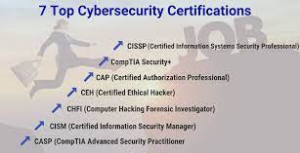Introduction
The realm of cyber security is dynamic and ever-evolving, and landscape a cybersecurity job requires not only expertise but also the ability to articulate your knowledge effectively during an interview. In this blog post, we’ll dive into the 15 most asked questions to help you prepare and succeed in your cybersecurity job interviews. Additionally, we’ll explore the importance of cyber security job interviews, both online and traditional, as they play an eminent role in validating your skills and boosting your credibility in the cyber security domain
Top 15 Cyber Security Interview Questions
1. What is the CIA Triad in Cyber security?
Ans. This question assesses your basic foundational knowledge. Answer it by explaining that the CIA Triad stands for Confidentiality, Integrity, and Availability, besides highlighting their significance in securing information.
2. Can You Explain the Difference Between Symmetric and Asymmetric Encryption?
Ans. Showcase your understanding of encryption by differentiating symmetric (same key for encryption and decryption) and asymmetric (public and private keys) encryption methods.
3. What is a Firewall, and How Does It Work?
Ans. Demonstrate your understanding of network security by explaining that a firewall is a network security device which monitors and controls incoming and outgoing network traffic based on predetermined security rules.
4. What is the Principle of Least Privilege (PoLP)?
Ans. Emphasise the importance of limiting access rights for users to the bare minimum necessary to perform their job functions, which reduces the risk of unauthorised access.
5. Explain the Concept of Two-Factor Authentication (2FA).
Ans. Showcase your awareness of enhancing security by requiring users to provide two different authentication factors, typically something they know (password) and something they have (token or device).
6. What is a Denial of Service (DoS) Attack, and How Can It be Mitigated?
Ans. llustrate your knowledge of cyber threats by defining a DoS attack and discussing mitigation strategies, such as rate limiting and implementing a Content Delivery Network (CDN).
7. What is a Man-in-the-Middle (MitM) Attack?
Ans. Elaborate your understanding of MitM attacks by explaining how an attacker intercepts and potentially alters the communication between two parties without their knowledge.
8. How Does Endpoint Security from Network Security?
Ans. Highlight your knowledge of security layers by illustrating that while network security focuses on protecting an organisation’s IT infrastructure, endpoint security centres around securing individual devices.
9. Can You Explain the Role of Intrusion Detection Systems (IDS) and Intrusion Prevention Systems (IPS)?
Ans. Elaborate your familiarity with proactive security measures by discussing how IDS detects potential threats, while IPS actively prevents unauthorised access or malicious activities.
10. What is the Dark Web, and How Does It Pose a Threat to Cybersecurity?
Ans. Display your awareness of emerging threats by defining the dark web and discussing its role in hosting illegal activities, which emphasises the significance of monitoring and tracking potential risks.
11. How Would You Handle a Security Breach?
Ans. Demonstrate your problem-solving skills and crisis management capabilities by outlining a systematic response plan, which includes identification, containment, eradication, recovery, and lessons learned.
12. Explain the Importance of Regular Security Audits and Penetration Testing.
Ans. Emphasise your commitment to ongoing improvement by discussing how security audits and penetration testing help identify vulnerabilities, assess risks, and ensure the effectiveness of security measures.
13. What Are Common Social Engineering Techniques, and How Can They Be Mitigated?
Ans. Showcase your understanding of human-centric cyber threats by discussing techniques like phishing, pretexting, and baiting, and proposing mitigation strategies such as user awareness training.
14. How Does a Virtual Private Network (VPN) Enhance Security?
Ans. Throw light on your knowledge of network security by explaining that a VPN encrypts internet traffic, which provides a secure connection, especially when accessing networks remotely.
15. What Do You Consider the Biggest Cyber Security Threats in 2023?
Ans. llustrate your awareness of current cybersecurity trends by discussing threats such ransomware, supply chain attacks, and zero-day vulnerabilities, emphasising the need for proactive measures.
Cyber Security Certifications
To complement your expertise and increase your employability in the cybersecurity domain, consider pursuing reputable certifications. Here are some of the best cyber security, both online and offline:
- CISSP( Certified Information Systems Security Professional):
Recognised globally, CISSP validates your expertise in designing, implementing, and managing an organisation’s security program.
- CompTIA Security+:
A foundational certification covering core cybersecurity skills, ideal for beginners or those looking to broaden their knowledge.
- CEH (Certified Ethical Hacker):
It focuses on the skills responsible for managing, developing, and overseeing information security programs.
- CISM (Certified Information Security Manager):
It targets professionals responsible for managing, developing, and overseeing information security programs.
- AWS Certified Security- Speciality:
It validates your knowledge of securing data, systems, and applications on the AWS platform.
Conclusion
In the cut throat landscape of cybersecurity, excelling in interviews requires a blend of technical acumen and effective communication. By mastering these 15 cybersecurity interview questions and considering relevant certifications, you position yourself as a formidable candidate ready to tackle the challenges of securing digital landscapes in 2023 and beyond.







No comment yet, add your voice below!